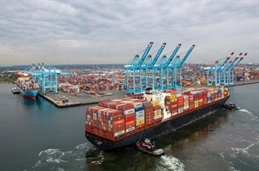
The Port of Los Angeles (Port of LA), one of North America's busiest cargo ports, saw volumes decline for the first time in 10 months as the impact of new tariff measures began to make a dent.
Port of LA processed 716,619 Twenty-Foot Equivalent Units (TEUs) in May, 5% less than last year.
It said that after 10 straight months of year-over-year growth, overall cargo volume slowed due to the impact of tariffs on both imports and exports.
"May marked our lowest monthly cargo output in over two years," Gene Seroka, executive director at Port of Los Angeles, told a media briefing.
"While May volume is typically stronger than April as we approach our traditional peak season, our imports dropped 19% compared to last month."
Seroka said uncertainty would continue unless a trade agreement is reached soon.

[Source: Port of LA]
"Unless long-term, comprehensive trade agreements are reached soon, we'll likely see higher prices and less selection during the year-end holiday season," the Port of LA executive director added. "The uncertainty created by fast-changing tariff policies has caused hardships for consumers, businesses and labour."
Ernie Tedeschi, director of Economics at The Budget Lab at Yale, joined Seroka for the briefing and discussed the impacts tariffs have had on American consumers.
"The Budget Lab has been modelling the impact of tariffs on American households since the first announcements earlier this year. Tariffs would raise average prices by 1.5%, a loss in purchasing power of nearly US$2,500 per household per year," Tedeschi said.
May 2025 loaded imports came in at 355,950 TEUs, 9% less than the previous year.
Loaded exports landed at 120,196 TEUs, a 5% drop from 2024. The Port processed 240,472 empty container units, 2% more than last year.
After five months in 2025, the Port of Los Angeles has handled 4,063,472 TEUs, 4% more than the same period in 2024.



